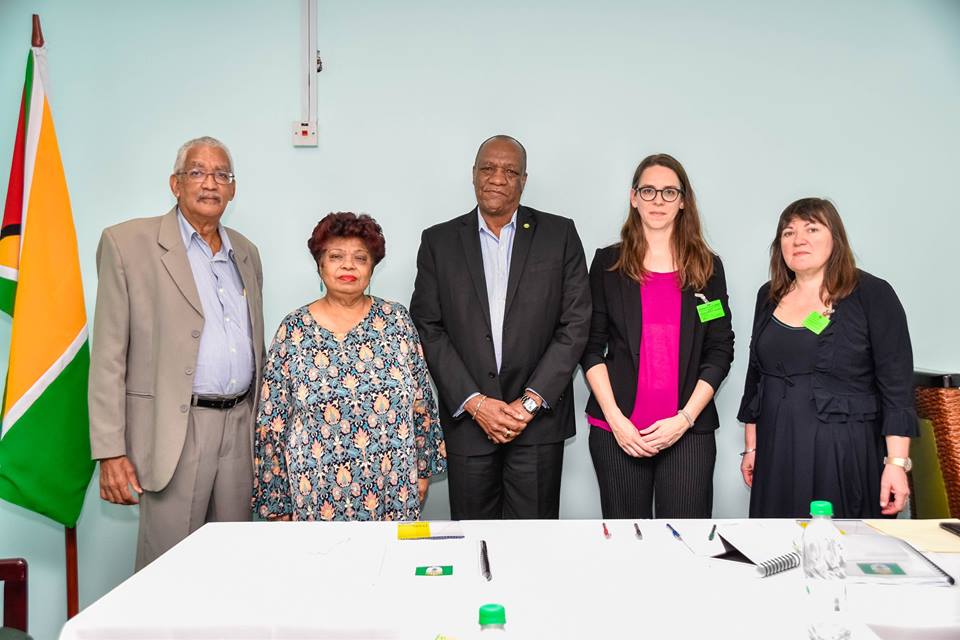
Minister of State and General Secretary of A Partnership for National Unity (APNU), Mr. Joseph Harmon, Minister of Social Protection and General Secretary of the People’s National Congress (PNC), Ms. Amna Ally and Political Advisor, Dr. Mark Kirton, this afternoon, met with Carter Center representatives Associate Director, Ms. Brett Lacy and Legal and Electoral Advisor Ms. Anne Marlborough at the Ministry of the Presidency.
March 21 2019
As President David Granger prepares to announce a general election date this weekend, the United States’ Carter Center Thursday night said Guyana’s electoral systems have the integrity to prevent electoral fraud.
“As The Carter Center has recognized in the past, Guyana’s existing safeguards are strong and consistent with international standards for democratic elections,” the Center said.
The Centre said if a separate list of the names of overseas-based Guyanese is extracted by the Immigration Department, elections would be possible in July or August 2018.
However, the Centre noted that if the Caribbean Court of Justice invalidates the no-confidence vote, there would be no need for an election.
“The Carter Center is aware of pending decisions from the Court of Appeal and that these decisions may be appealed to the Caribbean Court of Justice (CCJ). In the event that final court rulings invalidate the vote of no confidence, elections would not need to be held this year,” the Center.
Following is the full text of the Carter Center’s statement.
GEORGETOWN, GUYANA — A Carter Center delegation led by Jason J. Carter, chairman of the Carter Center’s Board of Trustees, has been in Guyana this week meeting with key stakeholders to learn about the current challenges facing Guyana and to assess whether the Center could assist Guyanese going forward.
The Center’s visit comes at a critical moment. Guyana could move into a time of constitutional uncertainty after March 22, which marks the end of a three-month period following a contested vote of no confidence and the deadline to hold elections, unless there is a political agreement about the way forward and either a National Assembly vote or a court decision to approve an extension of the electoral timeline.
From its conversations with senior political leaders on both sides, the GECOM secretariat and commissioners, and a variety of other stakeholders, the Carter Center provides the following comments:
- President David Granger and Opposition Leader Bharrat Jagdeo have a shared desire to have elections in the shortest possible time, consistent with law and pending judicial decisions.
- Because March 21, 2019, is a national holiday, under Guyana’s Interpretation and General Clauses Act, the constitutional three-month period following the no-confidence vote would expire on the following day, March 22, 2019.
- The Carter Center reiterates its support for Guyana and urges all sides to find an agreed-upon way forward to establish an early election date. The Carter Center hopes the National Assembly is able to convene no later than March 22 to authorize an extension of the election timeline and to avoid a period of constitutional uncertainty.
- GECOM commissioners recognize that the current voters list is “bloated.” A primary concern is the likely inclusion of significant numbers of Guyanese living overseas. GECOM commissioners hold different views about whether or not to conduct a new house-to-house registration exercise to address this concern.
- GECOM’s chief electoral officer has prepared various scenarios for election timelines, and in the event that a new house-to-house registration is not required, elections could be organized in July or August. Conducting a new house-to-house registration would mean an election would not be possible until late November.
- Give the extraordinary circumstances surrounding the vote of no confidence and the constitutional requirement for early elections, there are several steps that could be considered to try to mitigate concerns about the voter list while scheduling elections as early as possible, including:
- Using data from the Ministry of Immigration, GECOM could prepare a reference list of Guyanese who are currently overseas (for three months or longer) and also included on the voter registration list. The voters on the reference list would not be removed from the registration list (other than through already existing legal procedures like, for example, the claims and objections process). But the reference list would be made available to party agents and scrutineers to facilitate enhanced review of these names during the electoral process, both during the claims and objections period and on election day, serving as a deterrent to multiple or substitute voting.
- The reference list would supplement safeguards already in place in Guyana’s electoral administration to protect against multiple voting. As The Carter Center has recognized in the past, Guyana’s existing safeguards are strong and consistent with international standards for democratic elections.
- In addition, GECOM could consider providing resources to expand the number of political party agents and scrutineers who can monitor the electoral process before, during, and after election day. These efforts could be complemented by a strong presence of international observers and domestic citizen observers to enhance transparency.
- The Carter Center is aware of pending decisions from the Court of Appeal and that these decisions may be appealed to the Caribbean Court of Justice (CCJ). In the event that final court rulings invalidate the vote of no confidence, elections would not need to be held this year.
Background: Prior to the delegation’s visit, former U.S. President Jimmy Carter spoke with President Granger and opposition leader Jagdeo, both of whom indicated they would welcome a Carter Center team. The delegation is led by Jason J. Carter, President Carter’s grandson and the chairman of the Carter Center’s Board of Trustees and includes David Carroll and Brett Lacy of the Center’s Democracy Program.
